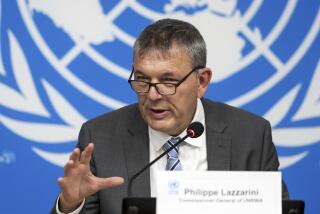Pakistan names career infantry officer as new military chief
ISLAMABAD, Pakistan -- Pakistan named a new army chief Wednesday, ending weeks of speculation over who would fill what has been seen as the most powerful position in the nuclear-armed nation.
Lt. Gen. Raheel Sharif, 57, a career infantry officer viewed as a moderate, will head Pakistan’s 600,000-person army when Gen. Ashfaq Kayani, 61, steps down Thursday after six years at the helm.
Prime Minister Nawaz Sharif announced the appointment on Twitter. Sharif is a common name and the two are not related.
Analysts said the choice, which includes a promotion to four-star general, was a safe, if not terribly inspiring, choice.
The appointment comes at a key time for Pakistan. A homegrown Taliban insurgency is threatening to wage a “bloody revenge campaign” after the death of its leader Hakimullah Mehsud on Nov. 1 in a suspected CIA drone strike. The umbrella organization of some 30 loosely affiliated insurgent groups has killed thousands of Pakistanis.
The country also faces uncertainty with the departure of all U.S.-led NATO combat troops from neighboring Afghanistan in late 2014, which is expected to lead to a vacuum and spark regional jockeying for influence. It faces continued tension with India over the divided Kashmir region and a separatist movement in southwestern Baluchistan province. And Pakistan continues its struggle to find a balance between uniformed and civilian rule in a country long dominated by the military.
The general election was the first time an elected government completed its term and handed over power to another elected government. Pakistan has seen three successful and numerous unsuccessful coups in its six-decade history.
While the election and transition of power were important steps, analysts warned that structural change doesn’t happen overnight.
“There should be no doubt that the military is and will remain the boss in Pakistan,” said Raza Rumi, an Islamabad-based political commentator. “Luckily for the politicians, the military has worked with them recently and doesn’t have much immediate appetite for meddling in politics. But it remains the biggest power center in Pakistan.”
While Prime Minister Sharif’s administration has taken a more accommodating approach toward India and Afghanistan, many in the army’s rank and file are wary of this shift, analysts said.
“In the army, we’re against this move,” said Saad Muhammad, a Peshawar-based analyst and retired brigadier general. “If he wants to bring the army on the same page with the civilian government, he’s got a lot of work ahead.”
Raheel Sharif’s appointment surprised many analysts, given that he’s third in line within the army, which in Pakistan has been called a state within a state. The favorite was Lt. Gen. Rashad Mahmood, seen as close ally to Kayani, who assumes the largely ceremonial job of chairman of the Joint Chiefs of Staff committee. He also is being promoted to four-star general.
Analysts said Sharif was unlikely to initiate any drastic reform.
“He is an average guy who fulfills all the qualifications to be an army chief,” said Ayesha Siddiqua, an Islamabad-based defense and security analyst. “He represents the status quo, not change.”
Sharif comes from a distinguished military family. His father was a major in Pakistan’s military. And both his uncle and his elder brother won Pakistan’s highest military award for valor in the 1965 and 1971 wars against India, respectively.
During his nearly four-decade military career, Sharif has served in Gilgit near the Indian border, played a key role at Pakistan’s military academy and commanded two infantry brigades. He is credited with helping craft a response to India’s cold-start doctrine – a plan to conduct coordinated offensive operations against Pakistan – even as New Delhi denies having any such doctrine.
Sharif, who served most recently as Kayani’s chief of staff and the army’s inspector general of training and evaluation, is credited with rewriting Pakistan’s infantry manual to include more modern principles of warfare.
Sharif also will have to contend with Pakistan’s dismal economic situation. Foreign exchange reserves are falling, a chronic fiscal deficit is widening and electricity shortages are endemic.
“The country’s bad economic situation will be another major challenge,” said Muhammad, the retired brigadier general. “It remains to be seen whether the state can provide enough resources to run and expand our defense priorities.”
ALSO:
China downplays U.S. bomber flight in disputed airspace
Israeli security forces kill three Palestinians in West Bank
Why Ukraine is staying in Russia’s orbit instead of turning West
Twitter: markmagnier
Special correspondent Sahi reported from Islamabad and Magnier from New Delhi.
More to Read
Sign up for Essential California
The most important California stories and recommendations in your inbox every morning.
You may occasionally receive promotional content from the Los Angeles Times.









